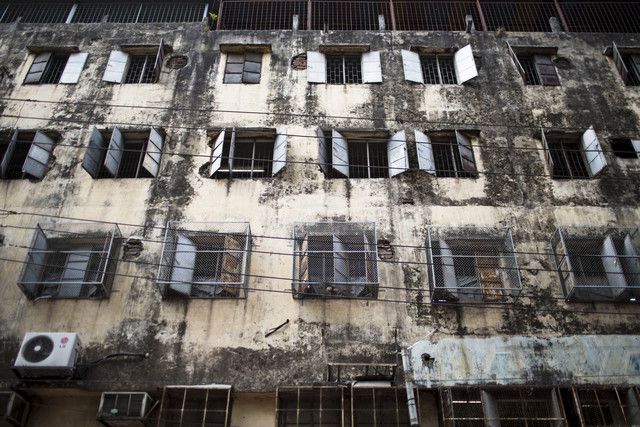Since the collapse of the Bangladesh factory that killed over 1,100 people in April, the Bangladesh government is now working to uncover how many factories may be on the verge of destruction.
Of the 3,500 factories in the capital, the Dhaka Development Authority has inspected about 300 so far. Many problems have already been found with inspections far from fully completed. Besides cracked walls and unsafe staircases, some roofs are also weighed down by water tanks. Bloomberg News reporters Mehul Srivastava and Sarah Shannon shadowed Mohammed Helal Ahmed, an engineer working for the Dkaha city government whose been tasked with surveying the city’s factories. Ahmed and his colleagues conduct building inspections and compile data the government can use to improve safety for workers. Some factories won’t even allow the inspector to enter the building. One such factory was Anzir Apparels Ltd. located in Shamsher Plaza. Only after battling with security guards and putting up a fight with the factory’s administrative director was Ahmed allowed in to do his job. Ahmed found inventories stacked high in stairways and blocking fire exits, posing a serious risk for workers in the event they needed to make a quick exit. Using detailed shipping data and supply chain records from Import Genius, reporters Srivastava and Shannon were able to determine exactly which U.S. retailers are selling clothes made there.
Records within Import Genius’ database of over 80 million shipping manifests showed that Anzir Apparels Ltd. had supplied U.S. retailers Wet Seal Inc., Cherry Stix, and New York-based Intertex Apparel since January 2010. When asked about the relationship with this supplier, all companies either didn’t provide comment or didn’t respond to messages. Anzir Apparels also supplies to Clayton based in Nigeria, and HRM Sourcing Ltd., a Bangladesh sourcing company.
The inspections are currently just serving to map out the areas in need of restoration. Inspections won’t amount to immediate attention. Despite knowledge of the problem, resources are extremely limited. “Five years of renovations and retrofits could cost western retailers and Bangladesh owners as much as $600,000 a factory, or $3 billion over the next five years, according to an estimate by the Workers Right Consortium of Washington. So far, retailers have promised just $2.5 million each for fire safety training and inspections, with the cost of any upgrades to be thrashed out between each factory and the retailers.” Because factory management is resistant to these inspections, it seems an already daunting task will be further dragged out. Most of the time, Ahmed is lucky if he can inspect half of the factories slated for a particular day. As inspection documents continue to pile up, it seems American retailers also continue to work with suppliers housing workers in deteriorating factories. Read the original story here: Sweating Bangladesh Surveyor Races to Avoid Next Tragedy
